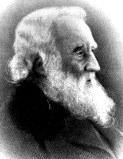Robert Chapman: Famous for Love

Early in Robert Chapman’s ministry, his friends were not impressed with his preaching. They told him to give it up. Chapman replied: “There are many who preach Christ, but not so many who live Christ. My great aim will be to live Christ.”1 Chapman did become known as a highly regarded preacher in 19th century England,2 but he is most remembered for fulfilling his life goal: He lived Christ, evidenced most clearly in his love for others. Consider the following people who experienced Chapman’s love.
The Poor: In God’s providence, Chapman was converted in London while attending John Street Chapel, which was near the slums. Many in the church were poor, and Chapman was intrigued by their lives. Soon he was regularly ministering within the impoverished communities, bringing food, clothing, and the gospel. Each Sunday he brought a poor blind lady to the chapel.
When Chapman moved to Barnstaple to pastor, he intentionally bought a home among the poor. Someone once offered him a place in a better part of town, but Chapman refused. As Robert L. Peterson explains, “He wanted to live where even the poorest person could come to him without hesitation.”
Guests in His Home: Robert Chapman never married, but when he purchased his first home, he bought a large residence in order to provide a retreat for missionaries and Christian workers. The lodging was free.
Chapman asked his guests to leave their shoes or boots outside of their rooms so that he could clean them. When people objected, Chapman wouldn’t relent. One guest remembers Chapman saying, “It is not the custom in our day to wash one another’s feet; that which most nearly corresponds to this command of the Lord is to clean each other’s boots.”
The Church: Chapman was a caring pastor with extreme patience. He once visited a lady in his church, but she was so upset that she scolded him on her doorstep. Chapman calmly replied to a man nearby, “Dear brother, listen to this dear sister; she is telling me all that is in her heart.”
Perhaps Chapman had this froward (contrary) woman in mind when he wrote the following verse to one of his hymns:
Thy brethren, Lord, are my delight,
I love them strong or weak;
They all are precious in my sight,
The froward with the meek.
The Lost: Chapman’s daily walk in and around Barnstaple provided opportunities to proclaim Christ. His love for the lost also included the unsaved abroad. Chapman was burdened for Spain throughout his ministry and took several “missionary journeys” there, even though it was initially dangerous.
Chapman’s concern for unbelievers was also demonstrated in his commitment to missionaries. For example, he regularly corresponded with J. Hudson Taylor, the famous missionary to China. He once wrote to him, “My dear brother Taylor, Consider our claim on you. We desire fellowship with you in your work. Oh! Come and speak to us your brethren here. Say when you can come…God delights to fill our open mouths.”
Children: When Robert Chapman was in his 80’s, he was the guest of J.R. Caldwell and his family in Scotland. Caldwell wrote this about the visit:
A bright, genial, loving and attractive spirit drew out the confidence even of the little ones. He used to play with our little girl, then two or three years old, in the afternoons at a childish game on the carpet…; and one morning before the household was awake, he had made a paper kite for our son, then about six years old, and was out with him by nine o’clock helping him to fly it.3
A missionary remembers Chapman declaring, “My business is to love others and not to seek that others shall love me.” His business thrived, and he became famous for his Christ-like love. Could there be any better legacy?
_______________
1Robert L. Peterson, Robert Chapman (Neptune, NJ: Loizeaux, 1995), 29. All the quotes in this article are taken from this book.
2Chapman was one of the key early leaders in the Brethren movement, serving the Lord as a pastor in Barnstaple, England. Some of his noteworthy friends were George Muller, J. Hudson Taylor, and Charles Spurgeon.
3Peterson, 150.

